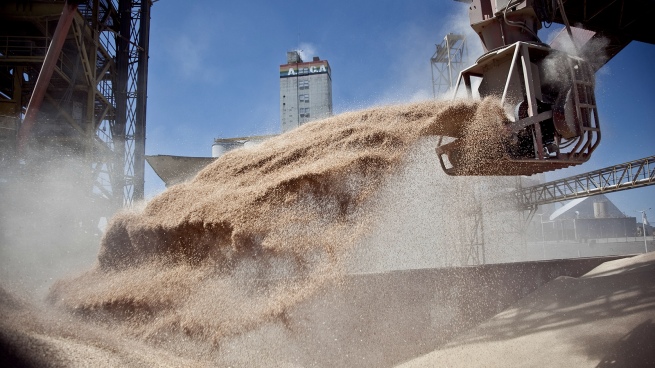Foreign exchange settlements for exports of cereals and oilseeds and their derivatives reached historical maximum records for the sector both in last March and in the accumulated of the first quarter, according to the numbers reported this Friday by the Chamber of the Oil Industry (Ciara) and the Cereal Exporters Center (CEC).
In this sense, the companies of the agro-export sector liquidated US$ 2,984.03 million last month, which meant the best March of the records of the last 20 years. Thus, the accumulated foreign currency income from agricultural exports in the first quarter reached US$ 7,926.08 million.
What was settled in March meant an increase of 7% compared to the same month of the previous year, and an increase of 16% compared to last February, Ciara and CEC, entities that represent 48% of Argentine exports, specified in a statement.
For this year, the Rosario Stock Exchange forecasts that some US$38.6 billion will enter as foreign currency settlement for soybean, wheat, corn and sunflower exports.
Likewise, foreign currency income in the first quarter represented a growth of 17.87% compared to the same period last year, and an absolute record for the same period since the beginning of this century.
“International prices maintained their upward trend, although shipments were affected by the persistent lowering of the Paraná River, which reduces loads in ports upriver, as well as changing weather conditions,” Ciara and CEC underlined.
In addition, they indicated that “the total of the foreign exchange reported monthly is fully deposited in the Central Bank”, and specified that “the State, through taxes, represents about 50% of the foreign exchange income of the cereal-oilseed complex, according to data from the Agricultural Foundation for the Development of Argentina (FADA)”.
In this sense, they underlined that “this tax burden has increased since the recent rise in export duties”, which brought withholdings from 31% to 33% for foreign sales of soybean oil and flour.
The oilseed-cereal complex, including biodiesel and its derivatives, contributed 48% of total Argentine exports last year, according to Indec data.
The liquidation of foreign currency is fundamentally related to the purchase of grains that will later be exported either in their same state or as processed products, after an industrial transformation.
Most of the foreign currency income in this sector occurs well in advance of the export, anticipation that is around 30 days in the case of the export of grains, and reaches up to 90 in the case of oils and protein meals. This anticipation also depends on the time of the campaign and the grain in question, so there are no delays in the settlement of foreign exchange.
The oilseed-cereal complex, including biodiesel and its derivatives, contributed 48% of Argentina’s total exports last year, according to data from the National Institute of Statistics and Censuses (Indec).
The country’s main export product is soybean meal (14.2% of the total), which is an industrialized by-product generated by this agro-industrial complex, which currently has a high idle capacity of close to 50%. The second most exported product last year, according to the Indec, was corn (11%) and the third was soybean oil (6.9%).
For this year, the Rosario Stock Exchange forecasts that some US$38.6 billion will enter as foreign currency settlement for soybean, wheat, corn and sunflower exports.
While the Mediterranean Foundation outlined a broader picture, which includes export chains such as peanuts and biodiesel, and estimated revenues of US $ 44,500 million, the equivalent of the current reserves of the Central Bank of the Argentine Republic (BCRA) .
In this framework, the price increases of both cereals and oilseeds, meat and hydrocarbons, as a result of the war between Russia and Ukraine, played a determining role in the higher income expected for the coming months until the end of anus.









